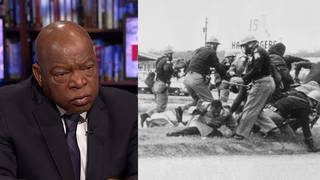
Guests
- John Lewislongtime civil rights advocate and Democratic congressman from Georgia.
John Lewis was a young organizer with the Student Nonviolent Coordinating Committee when he marched with 600 others across the Edmund Pettus Bridge 50 years ago. On Saturday, he returned to Alabama as a Democratic congressman from Georgia to introduce President Obama during the ceremonies commemorating Bloody Sunday, when Lewis and other voting rights activists were beaten by Alabama state troopers. “On that day, 600 people marched into history,” Lewis recalls. “Some of us were left bloody … but we never became bitter.” Looking forward, Lewis notes, “Our country will never, ever be the same after what happened on this bridge,” but adds, “there’s still work left to be done.”
Transcript
AMY GOODMAN: Protesters singing “We Shall Not Be Moved” back in 1965. This is Democracy Now!, democracynow.org, The War and Peace Report. I’m Amy Goodman. On Saturday, March 7th, President Obama and Congressman Lewis, John Lewis, spoke in Selma near the Edmund Pettus Bridge. John Lewis was one of 600 civil rights activists who were attacked by state troopers. He was later hospitalized and had his skull fractured.
REP. JOHN LEWIS: We, as a nation, have a great deal to be thankful for. Jimmie Lee Jackson—Jimmie Lee Jackson, whose death inspired the Selma march, along with so many others, did not make to see this day. But you and I are here. We can bear witness to the distance we have come and the progress we have made in 50 years. And we must use this moment to recommit ourselves to do all we can to finish the work. There’s still work left to be done. Get out there and push and pull, until we redeem the soul of America.
On March 7, 1965, a few innocent children of God, some carrying only a bedroll, a few clutching a simple bag, a plain purse or a backpack, were inspired to walk 50 dangerous miles from Selma to Montgomery to demonstrate the need for voting rights in the state of Alabama. On that day, on that day, 600 people marched into history, walking two by two down this sidewalk, not interfering with the free flow of trade and commerce, not interfering with traffic, with a kind of military discipline. We were so peaceful, so quiet, no one saying a word. We were beaten, tear-gassed. Some of us was left bloody right here on this bridge. Seventeen of us were hospitalized that day. But we never became bitter or hostile. We kept believing that the truth we stood for would have the final say. This city, on the banks of the Alabama River, gave birth to a movement that changed this nation forever. Our country will never, ever be the same because of what happened on this bridge.
It is a great honor for me to return to my home state of Alabama, to present to you—not to introduce to you, but to present to you—the president of the United States. If someone had told me, when we were crossing this bridge, that one day I would be back here introducing the first African-American president, I would have said, “You’re crazy. You’re out of your mind. You don’t know what you’re talking about.” President Barack Obama!












Media Options